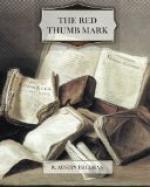Sir Hector sat down, and the jury, who had listened to his speech with solid attention, gazed expectantly at the judge, as though they should say: “Now, which of these two are we to believe?”
The judge turned over his notes with an air of quiet composure, writing down a word here and there as he compared the various points in the evidence. Then he turned to the jury with a manner at once persuasive and confidential—
“It is not necessary, gentlemen,” he commenced, “for me to occupy your time with an exhaustive analysis of the evidence. That evidence you yourselves have heard, and it has been given, for the most part, with admirable clearness. Moreover, the learned counsel for the defence has collated and compared that evidence so lucidly, and, I may say, so impartially, that a detailed repetition on my part would be superfluous. I shall therefore confine myself to a few comments which may help you in the consideration of your verdict.
“I need hardly point out to you that the reference made by the learned counsel for the prosecution to far-fetched scientific theories is somewhat misleading. The only evidence of a theoretical character was that of the finger-print experts. The evidence of Dr. Rowe and of Dr. Thorndyke dealt exclusively with matters of fact. Such inferences as were drawn by them were accompanied by statements of the facts which yielded such inferences.
“Now, an examination of the evidence which you have heard shows, as the learned counsel for the defence has justly observed, that the entire case resolves itself into a single question, which is this: ’Was the thumb-print that was found in Mr. Hornby’s safe made by the thumb of the prisoner, or was it not?’ If that thumb-print was made by the prisoner’s thumb, then the prisoner must, at least, have been present when the safe was unlawfully opened. If that thumb-print was not made by the prisoner’s thumb, there is nothing to connect him with the crime. The question is one of fact upon which it will be your duty to decide; and I must remind you, gentlemen, that you are the sole judges of the facts of the case, and that you are to consider any remarks of mine as merely suggestions which you are to entertain or to disregard according to your judgement.




